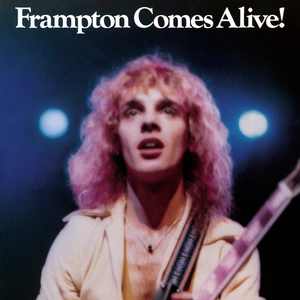Published on May 28, 1998
Once upon a time in the land of music, just before the Sonic
Plague that was disco and just after the birth of the Metal Dragon,
came upon the land a young prince (no, not that Prince — it’s a
metaphor, dammit!).
This young prince was lithe and blonde and long of hair, and
spoke in the soft, lilting tones of an Englishman, setting the
hearts of all the young maidens in the land to pittering and
pattering… and yet he could also pound out a tasty, jamming
eight-minute cover of “Jumpin’ Jack Flash” if the mood struck him.
Truly, for his one brief shining moment, this prince had it
all.
Leading into
Frampton Comes Alive!, nothing particularly suggested Peter
Frampton was about to issue the biggest selling live album of all
time (15 million units and counting… paying attention, Garth?).
Sure, he’d produced several well-regarded singles with Brit-pop
bands The Herd and Humble Pie, and shown off some very solid guitar
work and melodic tunesmithing on three solo studio outings.
But despite the strength of his musical chops, he’d been passed
off as something of a lightweight thanks to his forays into
sentimental, acoustic love songs. What
Frampton Comes Alive! let him do was show both sides of his
musical personality, the crooner and the rocker, and do it in the
charged setting of a high-energy live show. As Cameron Crowe says
in the liner notes, this album is “a testimony to Peter Frampton in
his natural habitat.” His lack of sustained success in any other
context makes these words ring truer today than ever.
Recorded largely in the cozy confines of San Francisco’s
legendary Winterland,
Frampton Comes Alive! captures the energetic, yet
unmistakably clean and terribly British pop-rock sound Frampton
featured on songs like “Something’s Happening” and “I Wanna Go to
the Sun.” Many songs dabble in blue-eyed funk, with the aptly-named
“Doobie Wah” in particular sounding like it could have been
borrowed from an early Doobie Brothers album. “(I’ll Give You)
Money” ventures even farther into the land of Cream, featuring a
fat guitar sound over a simple blues beat and a couple of
shimmering, authoritative solos from Frampton.
The keys to Frampton’s kingdom clearly came, though, in the
songs where his generally gentle approach to lyrics melded with a
choice radio-friendly riff or two, as in the monster hits “Show Me
the Way” and “Baby, I Love Your Way.” Songs for the ages? Maybe
not. But a great pop song is still a great pop song. You think
those girls in the audience screaming out the chorus of “All I Want
To Be (Is By Your Side)” cared whether it was the most original
approach they’d ever heard?
“Show Me The Way” also featured a relatively obscure rock
instrument (Joe Walsh being the other main practitioner), the
talkbox. Frampton’s inventive use of it as a melody instrument to
supplement his own voice provided a funky edge to an otherwise
straightforward pop song. It was, in hindsight, a brilliant
addition.
The talkbox gets a real workout on the other big song here, the
fourteen-minute (and surprisingly coherent at that) musical tour de
force “Do You Feel Like We Do.” Frampton’s made-for-concert
refrains segue perfectly into Bob Mayo’s entertaining keyboard jam,
some sharp soloing from Frampton, and then a minutes-long ride
through the outer reaches of talkbox territory, ending in a
breakout full-guitar finish. It’s a piece of work that manages to
be elegant, funky and hard-rocking all at once, and it’s quite
possibly the best thing he’s ever recorded.
There can be no question, however, that the album as a whole
represents Frampton’s musical high-water mark. It was, in fact, an
achievement from which he never seemed to recover. Twenty years
later Peter Frampton has become the answer to an obscure musical
trivia question. But for a year or two in the mid-70s, this prince
was the guy every girl wanted and every guy wanted to be… and
this album is all the evidence you’ll ever need that he didn’t do
it on looks alone.
